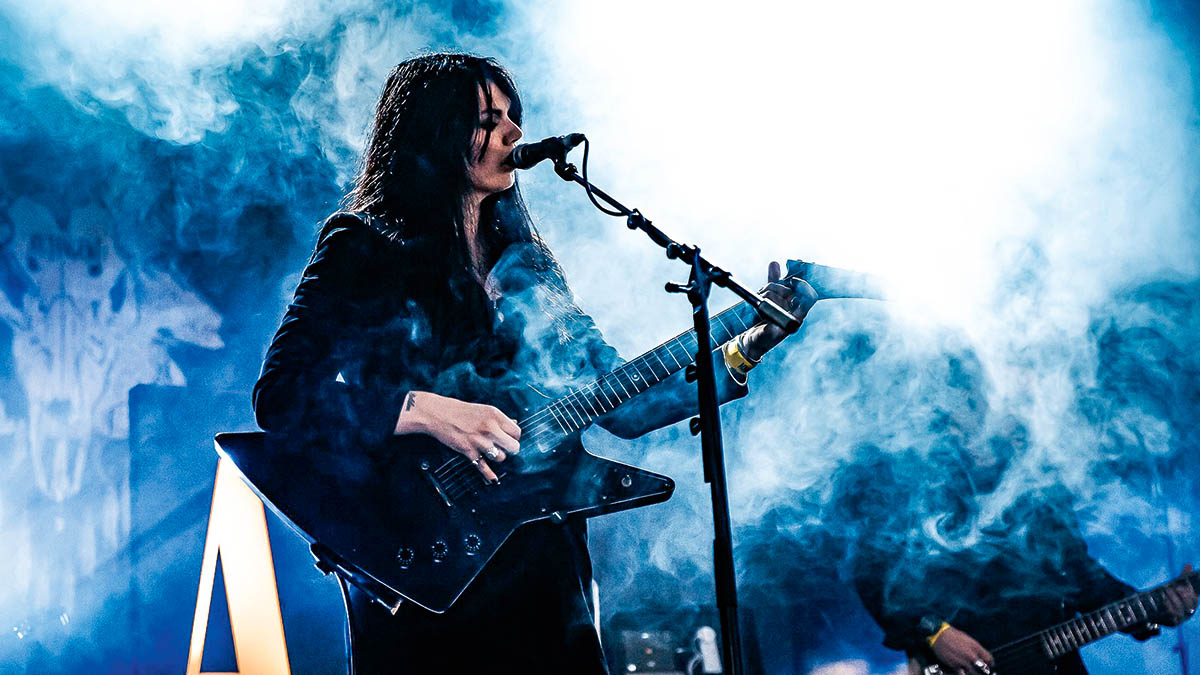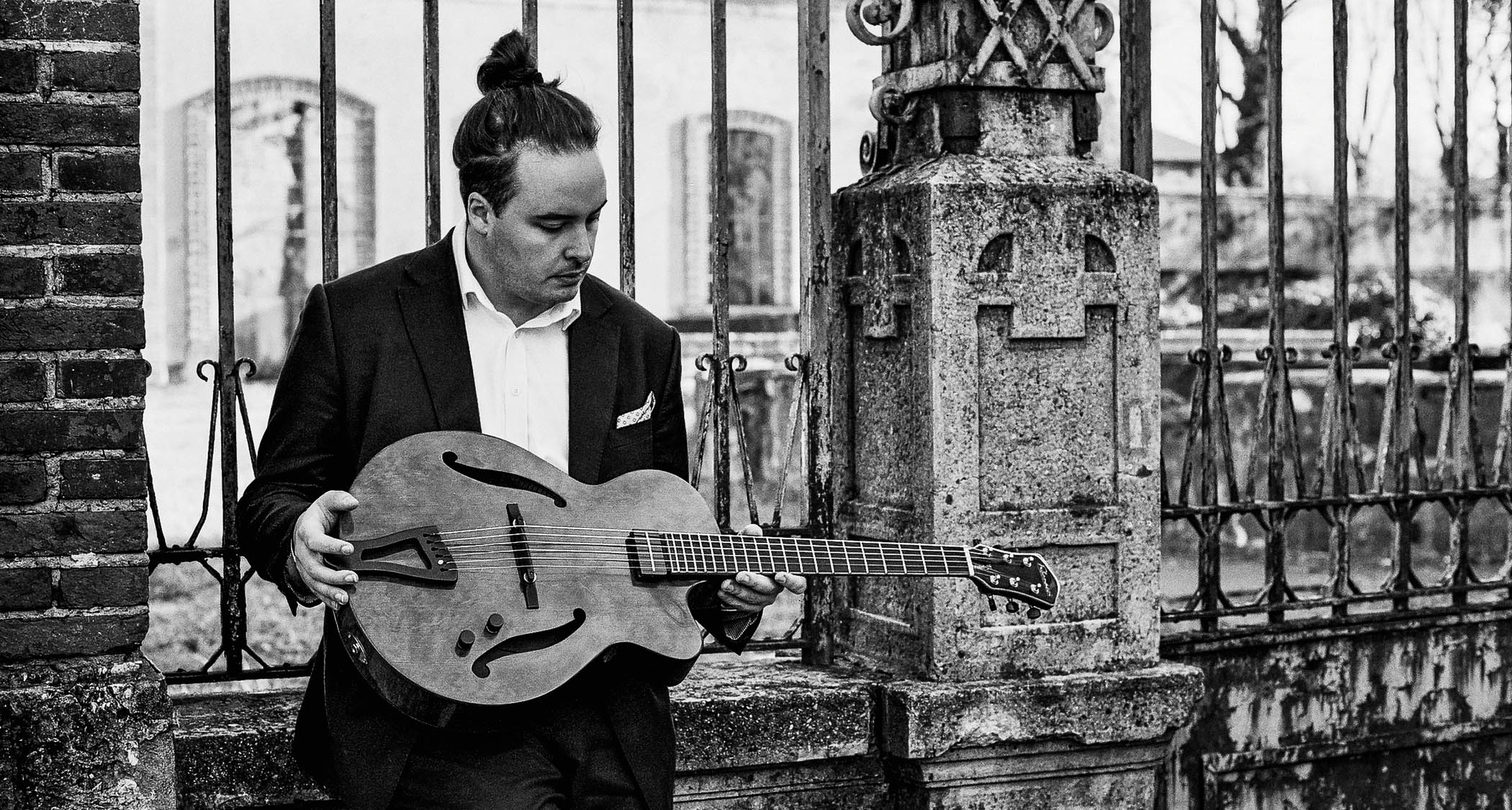A.A. Williams: “I didn’t have lessons or learn other people’s tabs or anything. I think there’s a punk-rock quality in that”
A pianist and cellist who never learned to play guitar in standard tuning, Williams is a player like no other, and her new album, As the Moon Rests, is a wild trip into new sounds and textures

London singer-songwriter A.A. Williams followed up the beautiful melancholy of gothic debut Forever Blue with As the Moon Rests last year, a journey further into post-rock stylings. A talented multi‑instrumentalist, Williams found the guitar a little down the line.
“I’d always listened to a lot of guitar-based music but hadn’t felt the compulsion to play any of it,” Williams tells us. “Years after studying piano and cello, someone a few doors down from me was throwing out this Squier Tele. It had a little sign under the strings saying, ‘Please take me, just needs work.’”
Change your tune
Although she had no prior experience of playing guitar, Williams’ classical training gave her a solid starting point on her six-string journey.
“My pal was a guitar tech, so we went to Denmark Street and bought new pickups, new tuners, new everything. Being a cellist, I’m used to 5ths, so I stuck it in DADGAD, thinking it’s a bit closer to start with, and started writing a few songs to get to know it a bit better. I have never learned to play in standard, although I know that’s highly illegal…” she laughs. “It’s mostly all in DADGAD; I have a baritone that is tuned to the same intervals but lower, so AEADEA, and one in CGCFGC.”
American Gothic
Williams’ original Squier remains dear to her, but she hasn’t been able to escape the inevitable thirst for more gear. “My main instrument is a 2001 Gibson Gothic Explorer and it’s just my ride or die; it’s incredible,” she gushes. “I got it on eBay; I saw it there and just thought I couldn’t not own it. It’s beautiful. I’ve had it for about three years now and it’s the one. The weight is perfect for me. I’m fairly tall and broad, and it balances so well.
“At some point in its history, somebody changed the pickups to an EMG 57/66 set and it’s a wonderful-sounding thing. I also use a Fender [Made In Japan] Jaguar baritone – and you try to get a backup for that! A friend of mine has one and will not sell it, no matter what.”
Strings to her bow
As a cellist who learned guitar in a non-standard tuning, Williams has developed a playing style of her own.
All the latest guitar news, interviews, lessons, reviews, deals and more, direct to your inbox!
“I haven’t learned in any proper capacity,” she explains. “I didn’t have lessons or learn other people’s tabs or anything. I think there’s a punk-rock quality in that I didn’t have a clue what I was doing when I started; I was just hacking at it and trying to find the sounds in my head.
“So there’s a lot of rhythm, and when it’s live I’m the rhythm person. I do all of the tremolo melody stuff on record and it’s great, but trying to do it and sing isn’t easy, so that all goes to my other guitar player.”
Widescreen sounds
Williams’ lockdown project, a collection of covers entitled Songs From Isolation and released in 2021, was an exercise in minimalism, with her performing interpretations of fan-requested songs solo on guitar and piano, with just some subtle loops. Her new album, As the Moon Rests, goes bigger, broadening her palette.
“There’s a lot happening there,” she grins. “I had a lot of time, so I spent longer on demos, getting them as close to what I wanted as possible. And in the studio we could spend time working with guitars, using three or four per song if it was needed – mess around with amp sounds, split signals… Having the luxury to be able to make it sound as substantial as possible, while keeping subtlety, was great.”
Right angular
Since purchasing her prized Gibson Gothic Explorer, AA Williams has found herself in a rather desirable situation with regard to instruments.
“I recently got a Gibson endorsement, which is very awesome,” she says. “I borrowed a few bits and pieces for the last tour. I had a gorgeous little SG, which I took with me, but I’m hoping they lend me a V – switching between a V and an Explorer would make me very happy.”
How about a signature model? “Oh, wow… Honestly, I’m crossing everything that someone will think that’s a good idea because I certainly do!”
- As The Moon Rests is out now via Bella Union.
Glenn Kimpton is a freelance writer based in the west of England. His interest in English folk music came through players like Chris Wood and Martin Carthy, who also steered him towards alternate guitar tunings. From there, the solo acoustic instrumental genre, sometimes called American Primitive, became more important, with guitarists like Jack Rose, Glenn Jones and Robbie Basho eventually giving way to more contemporary players like William Tyler and Nick Jonah Davis. Most recently, Glenn has focused on a more improvised and experimental side to solo acoustic playing, both through his writing and his own music, with players like Bill Orcutt and Tashi Dorji being particularly significant.

